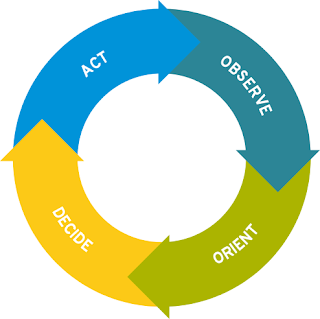This is the OODA Loop. The OODA Loop is your friend.
If you want all of the nitty-gritty details on the history of the OODA loop and its creator, click the link and read the Wikipedia page. We've got a lot of territory to cover today.
The "OODA" loop refers to a repeating four-step process for decision making:
-Observe
-Orient
-Decide
-Act
As the theory goes, in any confrontation (two pilots dog-fighting, two boxers punching up, two debaters debating), the party who can complete the OODA loop the fastest and most often will win (all other things being equal).
In this style of thinking, one of the most important things to do is to "get inside" your opponent's OODA loop so that they are responding to your actions instead of making true decisions. Forcing your opponent to respond to your actions guarantees that your always one or two steps ahead. They're still responding to your last Act, and you're already on your next Orient (or whatever).
Now, I doubt that Donald Trump has ever heard of the OODA loop, but his debate performances provide an excellent example of the principle in action. Why? Because he always forces his opponent to fight one step behind by dropping ridiculous statements.
Take the "bring back tariffs" exchange from a few debates back. Honestly speaking, were you expecting tariffs to be an issue in the 2016 election? I sure as hell wasn't. And that's why it was effective. I guarantee you that Bush and Rubio's campaigns spent zero hours prepping them to discuss tariffs, and I guarantee you that that's why Trump brought it up.
This in part explains why Trump drops bombshells like this (and it's not because he's crazy). It puts his opponent in a defensive stance - trapping them in the Observe/Orient phases of the OODA loop. Even if tariffs are as legitimately insane as most people say (I'm no economist), it doesn't matter for the duration of the debate. Trump can drop argument after argument in favor of tariffs, while his opponents are stuck with "uh, tariffs are bad? Right?"
Trump: "Tariffs! Yuge beautiful tariffs!"
Bush: "Really? Are we really talking about tariffs? Tariffs are bad. We tried tariffs, didn't work"
Trump: "China is kicking our butts! Bring Apple back to America! Tariffs have worked, and they'll make America great again!"
Bush: "But Adam Smith clearly-"
Trump: *Macho Man Randy Savage 'Whooo!'*
Short version: Trump says something crazy, forcing his opponents to Observe/Orient. Meanwhile, Trump can move forward with Decide/Act, getting inside his opponent's loop and dictating the terms of the discussion.
So. How do you break out of the Don's loops and restore control?
I'm going to suggest a technique from sales/PUA circles known as "Agree and Amplify." Simply speaking, you grab on whatever your opponent says, agree, and then build on it. In this case, you should take the arguments to obviously ridiculous extremes:
Trump: "Tariffs! Yuge beautiful tariffs!"
Bush: "Sure, tariffs. Sounds great. Then you can start selling opium to China, because Donald Trump obviously lives in 1839."
Trump: "China is kicking our butts! Bring Apple back to America! Tariffs have worked, and they'll make America great again!"
Bush: "I love it. I love Donald's plan! Let's make smartphones 1,000 times more expensive. Let's make cars 1,000 times more expensive. Let's make clothing 1,000 times more expensive. Tariffs are great."
Trump: "Won't happen. We can make tariffs work."
Bush: "Sure you can, buddy."
Would tariffs actually make smartphones 1,000 times more expensive? Who knows? Who cares? It's probably impossible to perfectly predict how tariffs would work in 2016. The point isn't to prove how smart and correct you are about the totally vital issue of tariffs, it's to stop reacting to your opponent.
Technically, Agree and Amplify is still reacting to your opponent. But the beautiful thing about Agree and Amplify is that it allows you to change how the audience perceives your opponent's words. Similar to Qualify and Attack, it allows you to move in close to your opponent. By putting their words in your mouth and exaggerating them to ridiculous proportions, you wipe the original statement out of the audience's mind.
The challenge is to create a sufficiently ridiculous image. Maybe Opium and 1,000 times more expensive smartphones doesn't stick in your mind - but you can think of something even more ridiculous as an exercise.
The rest of this post will be dedicated to spit-balling ridiculous Agree and Amplifies.
Trump: "Mexico is sending us their criminals and rapists!"
"Absolutely. In a few years, Mexico is going to have an absolute rape deficit."
"Look, I know a lot of people are upset about our rapist exchange program, but..."
"I, like Donald Trump, am very concerned about illegal aliens taking all of our good criminal jobs/ But don't worry Donald, you'll always be the best when it comes to fraud."
Trump: "We're building the wall!"
"Sure, we're building the wall. And if Donald builds it, the wall will be bankrupt in two years."
"Yes, absolutely. And we're going to build it all along the coasts and across the border with Canada too."
"Yes, and then we're going to shoot the entire country into space so that no non-Americans can ever get in again."
"We're going to build a wall, we're going to set up guard towers, and we're going to tattoo your Social Security Number on your arm."
"We're going to build the wall, and we're also going to shoot down incoming Mexicans aircraft."
Trump: "No more Muslim immigrants!"
"I agree with Donald Trump. And next, we're going to deport all the Catholics."
"Yes, yes, this is so important. We're also going to put all American Muslims in camps. For security."\
"Exactly! Then we're going to ban all Christians from leaving the country."



